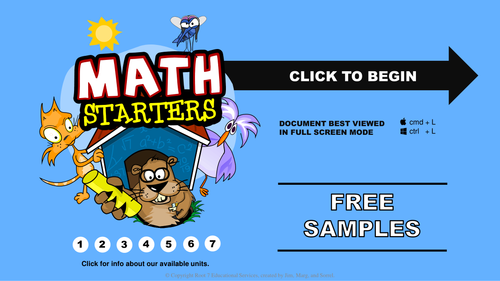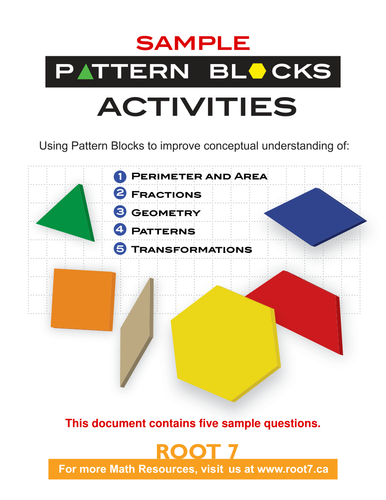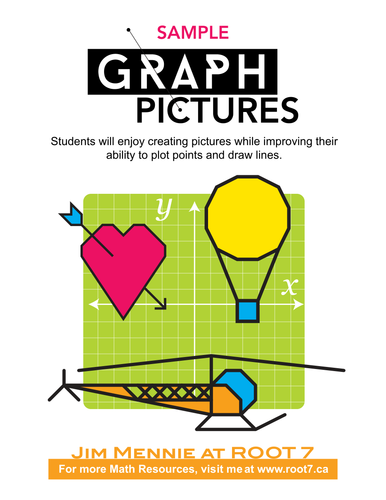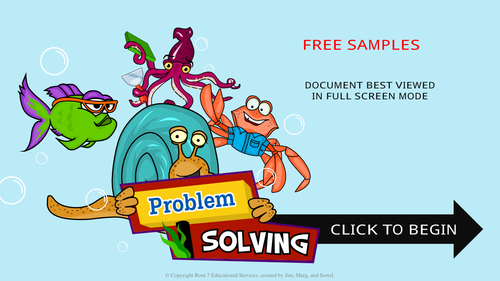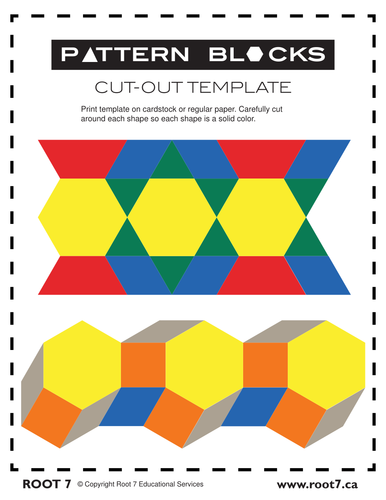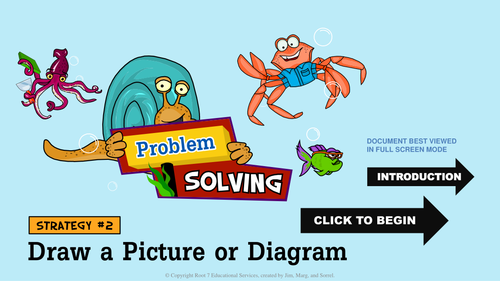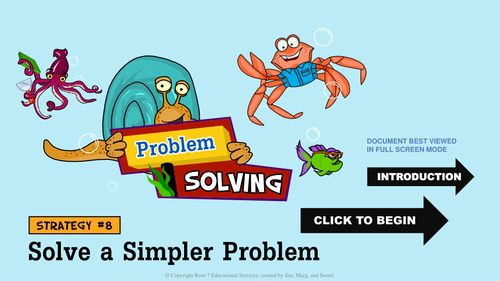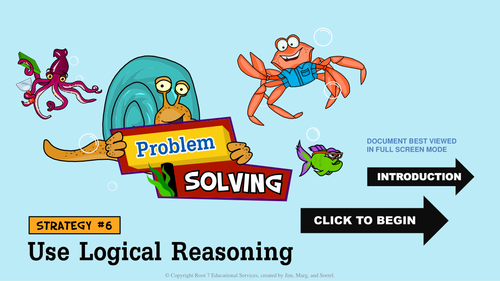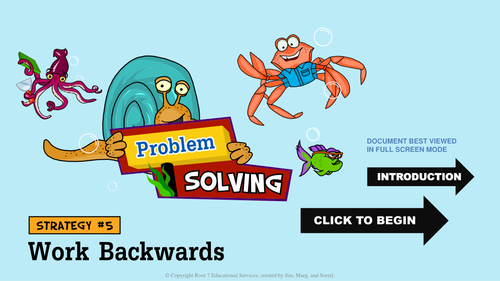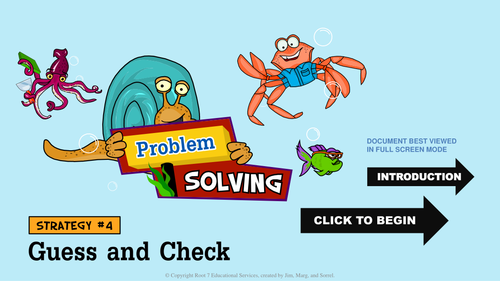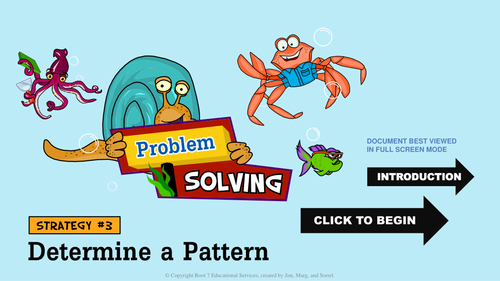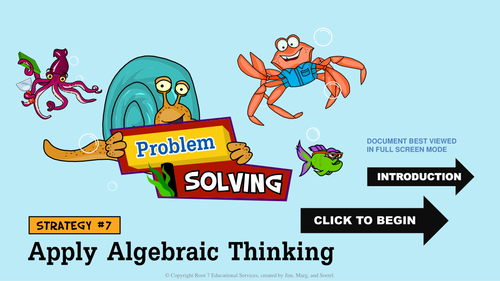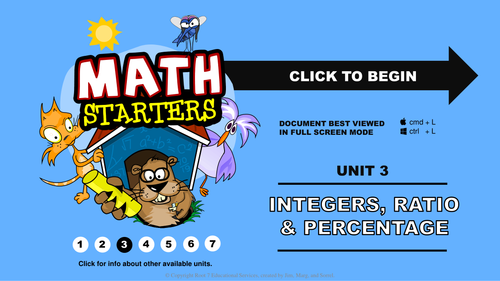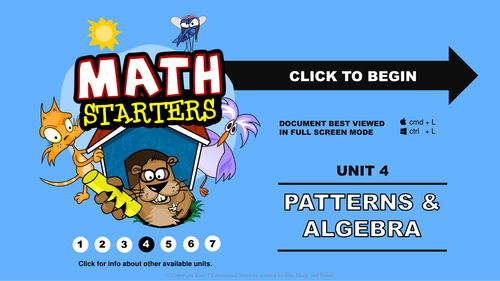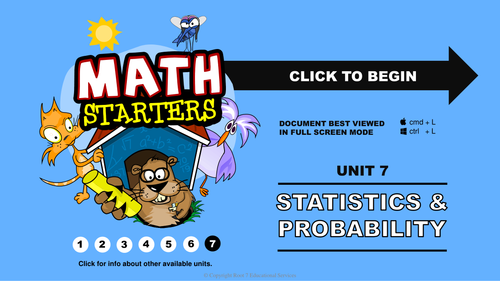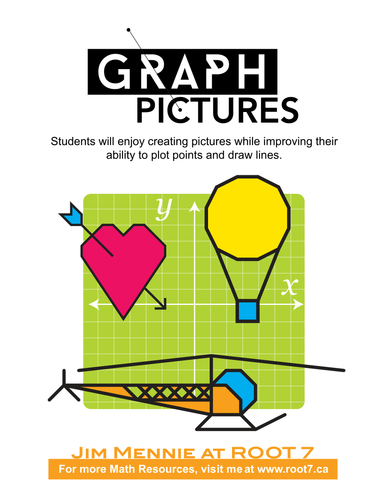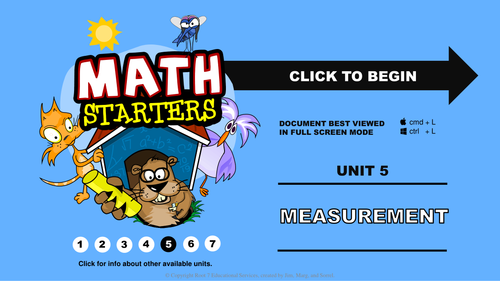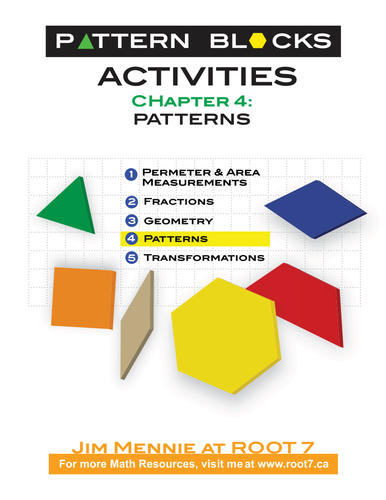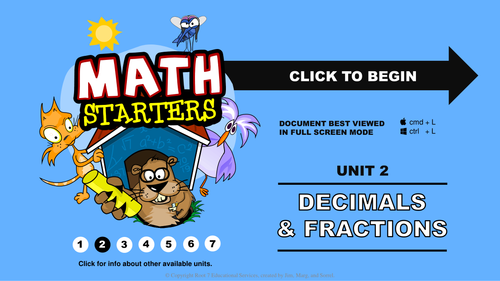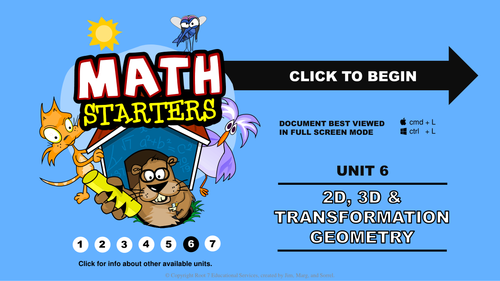
26Uploads
13k+Views
4k+Downloads
All resources

Math Starters - Free Sample
These bright, colorful, thought provoking questions are designed to encourage and motivate learners to become more involved in learning and enjoying mathematics. The Free Sample provides a taste of the motivational Math Starters created by Jim and the team at Root 7.
The resource can be used to start a lesson; to introduce or reinforce a concept; to develop and improve problem solving skills; support different ability levels and learning styles.
The resource can also be used in a resource centre, or as a fun way to learn in a home environment.

Pattern Blocks - Free Sample
Years of research on how children learn has shown that the use of manipulatives such as pattern blocks is a powerful tool for developing conceptual understanding of mathematics.
Students enjoy working with pattern blocks when they have been allowed time for free explorations. What seems like play to adults is an important part of building confidence and motivation in children.
Using Root 7’s Pattern Block resources enables students to be:
• Actively involved in doing math, which motivates them and builds confidence.
• Provided with excellent opportunities to work together, discuss mathematical ideas, and verbalize their thinking.
• Given concrete representations of mathematical ideas, thus providing a visual model to refer to.
• Provided with Extra Practice questions to extend and reinforce their knowledge and understanding.
How to use
• Assign one or more Activity questions to each student and allow them to work individually, in pairs or in groups
• Observe the students as they work and ask questions, or ask them to explain their work, to ensure they understand the mathematics
• Ensure they record their work as this helps them clarify their thinking and reinforce their understanding.
• The More Practice questions are important as they are designed to make the connection from “Hands-on” to “paper and pencil” ie from the concrete to the more abstract symbolic representation.
The activities in this free resource give a taste of the content and format of the 5 Pattern Block chapters.
Each chapter includes Teacher Notes and Answers.

Graph Pictures - Sample
The ability to plot points and draw lines on graph paper is important in the fields of Linear Algebra, Coordinate Geometry, Computer Graphics, Statistics, and many branches of Science.
This resource provides an easy, interesting, and fun way to for students to develop and practice these skills.

Math Problem Solving Strategies - Free Sample
Two statements that can be found in almost any math curriculum are:
Students learn best if they are actively involved in their learning.
Students should be able to apply various strategies to solve problems.
This Free Sample provides a sample of the problem solving available in our 9 units focusing on 8 problem solving strategies plus a series of Mixed Problems in which students decide on the most appropriate strategy to solve each problem.

Math Problem Solving Strategies - Draw a Picture Or Diagram
Two statements that can be found in almost any math curriculum are:
Students learn best if they are actively involved in their learning.
Students should be able to apply various strategies to solve problems.
This problem solving unit covering “Draw a Picture or Diagram” is one of 9 units focusing on 8 problem solving strategies plus a series of Mixed Problems in which students decide on the most appropriate strategy to solve each problem.
The colorful graphics in each unit are specially designed to interest and motivate students to try the problems.
Each unit comprises a Tutorial, a Worked Example and 6 colorful, motivational problems in which students are encouraged to apply the newly learned strategy.
All problems come with on screen hints and solutions.

Math Problem Solving Strategies - Solve a Simpler Problem
Two statements that can be found in almost any math curriculum are:
Students learn best if they are actively involved in their learning.
Students should be able to apply various strategies to solve problems.
This problem solving unit covering “Solve a Simpler Problem” is one of 9 units focusing on 8 problem solving strategies plus a series of Mixed Problems in which students decide on the most appropriate strategy to solve each problem.
The colorful graphics in each unit are specially designed to interest and motivate students to try the problems.
Each unit comprises a Tutorial, a Worked Example and 6 colorful, motivational problems in which students are encouraged to apply the newly learned strategy.
All problems come with on screen hints and solutions.

Math Problem Solving Strategies - Use Logical Reasoning
Two statements that can be found in almost any math curriculum are:
Students learn best if they are actively involved in their learning.
Students should be able to apply various strategies to solve problems.
This problem solving unit covering “Use Logical Reasoning” is one of 9 units focusing on 8 problem solving strategies plus a series of Mixed Problems in which students decide on the most appropriate strategy to solve each problem.
The colorful graphics in each unit are specially designed to interest and motivate students to try the problems.
Each unit comprises a Tutorial, a Worked Example and 6 colorful, motivational problems in which students are encouraged to apply the newly learned strategy.
All problems come with on screen hints and solutions.

Math Problem Solving Strategies - Work Backwards
Two statements that can be found in almost any math curriculum are:
Students learn best if they are actively involved in their learning.
Students should be able to apply various strategies to solve problems.
This problem solving unit covering “Work Backwards” is one of 9 units focusing on 8 problem solving strategies plus a series of Mixed Problems in which students decide on the most appropriate strategy to solve each problem.
The colorful graphics in each unit are specially designed to interest and motivate students to try the problems.
Each unit comprises a Tutorial, a Worked Example and 6 colorful, motivational problems in which students are encouraged to apply the newly learned strategy.
All problems come with on screen hints and solutions.

Math Problem Solving Strategies - Guess and Check
Two statements that can be found in almost any math curriculum are:
Students learn best if they are actively involved in their learning.
Students should be able to apply various strategies to solve problems.
This problem solving unit covering “Guess and Check” is one of 9 units focusing on 8 problem solving strategies plus a series of Mixed Problems in which students decide on the most appropriate strategy to solve each problem.
The colorful graphics in each unit are specially designed to interest and motivate students to try the problems.
Each unit comprises a Tutorial, a Worked Example and 6 colorful, motivational problems in which students are encouraged to apply the newly learned strategy.
All problems come with on screen hints and solutions.

Math Problem Solving Strategies - Determine a Pattern
Title: Math Problem Solving Strategies – Determine a Pattern
Two statements that can be found in almost any math curriculum are:
Students learn best if they are actively involved in their learning.
Students should be able to apply various strategies to solve problems.
This problem solving unit covering “Determine a Pattern” is one of 9 units focusing on 8 problem solving strategies plus a series of Mixed Problems in which students decide on the most appropriate strategy to solve each problem.
The colorful graphics in each unit are specially designed to interest and motivate students to try the problems.
Each unit comprises a Tutorial, a Worked Example and 6 colorful, motivational problems in which students are encouraged to apply the newly learned strategy.
All problems come with on screen hints and solutions.

Math Problem Solving Strategies - Apply Algebraic Thinking
Two statements that can be found in almost any math curriculum are:
Students learn best if they are actively involved in their learning.
Students should be able to apply various strategies to solve problems.
This problem solving unit covering “Apply Algebraic Thinking” is one of 9 units focusing on 8 problem solving strategies plus a series of Mixed Problems in which students decide on the most appropriate strategy to solve each problem.
The colorful graphics in each unit are specially designed to interest and motivate students to try the problems.
Each unit comprises a Tutorial, a Worked Example and 6 colorful, motivational problems in which students are encouraged to apply the newly learned strategy.
All problems come with on screen hints and solutions.

Math Starters - Integers, Ratio and percent
These bright, colourful, thought provoking questions are designed to encourage and motivate learners in to become more involved in learning and enjoying mathematics. The 19 high quality questions, with on-screen hints and answers, focus on integers, ratio, and percent.
The resource can be used to start a lesson; to introduce or reinforce a concept; to develop and improve problem solving skills; support different ability levels and learning styles.
The resource can also be used in a resource centre, or as a fun way to learn in a home environment.

Math Starters - Patterns and Algebra
These bright, colourful, thought provoking questions are designed to encourage and motivate learners in to become more involved in learning and enjoying mathematics. The 21high quality questions, with on-screen hints and answers, focus on patterns, and algebra.
The resource can be used to start a lesson; to introduce or reinforce a concept; to develop and improve problem solving skills; support different ability levels and learning styles.
The resource can also be used in a resource centre, or as a fun way to learn in a home environment.

Math Starters - Statistics and Probability
These bright, colourful, thought provoking questions are designed to encourage and motivate learners in to become more involved in learning and enjoying mathematics. The more than 20 high quality questions, with on-screen hints and answers, focus on Statistics and Probability.
The resource can be used to start a lesson; to introduce or reinforce a concept; to develop and improve problem solving skills; support different ability levels and learning styles.
The resource can also be used in a resource centre, or as a fun way to learn in a home environment.

Graph Pictures
The ability to plot points and draw lines on graph paper is important in the fields of Linear Algebra, Coordinate Geometry, Computer Graphics, Statistics, and many branches of Science.
This resource provides an easy, interesting, and fun way to for students to develop and practice these skills.
The 18 questions include work in all 4 quadrants and, in some cases applies the concepts of symmetry.

Math Starters - Measurement
These bright, colourful, thought provoking questions are designed to encourage and motivate learners in to become more involved in learning and enjoying mathematics. The more than 30 high quality questions, with on-screen hints and answers, focus on measurement.
The resource can be used to start a lesson; to introduce or reinforce a concept; to develop and improve problem solving skills; support different ability levels and learning styles.
The resource can also be used in a resource centre, or as a fun way to learn in a home environment.

Pattern Blocks Chapter 4 - Understanding Patterns
Years of research on how children learn has shown that the use of manipulatives such as pattern blocks is a powerful tool for developing conceptual understanding of mathematics.
Students enjoy working with pattern blocks when they have been allowed time for free explorations. What seems like play to adults is an important part of building confidence and motivation in children.
Using Root 7’s Pattern Block resources enables students to be:
• Actively involved in doing math, which motivates them and builds confidence.
• Provided with excellent opportunities to work together, discuss mathematical ideas, and verbalize their thinking.
• Given concrete representations of mathematical ideas, thus providing a visual model to refer to.
• Provided with Extra Practice questions to extend and reinforce their knowledge and understanding.
How to use
• Assign one or more Activity questions to each student and allow them to work individually, in pairs or in groups
• Observe the students as they work and ask questions, or ask them to explain their work, to ensure they understand the mathematics
• Ensure they record their work as this helps them clarify their thinking and reinforce their understanding.
• The More Practice questions are important as they are designed to make the connection from “Hands-on” to “paper and pencil” ie from the concrete to the more abstract symbolic representation.
The activities in Chapter 4: Patterns helps students increase their knowledge and understanding of various concepts of Patterns including, creating and extending pattern, determining the 100th and nth terms.
Each unit includes Teacher Notes and Answers.

Math Starters - Decimals and Fractions
These bright, colourful, thought provoking questions are designed to encourage and motivate learners to become more involved in learning and enjoying mathematics. The over 40 high quality questions, with on-screen hints and answers, focus on decimals and fractions.
The resource can be used to start a lesson; to introduce or reinforce a concept; to develop and improve problem solving skills; support different ability levels and learning styles.
The resource can also be used in a resource centre, or as a fun way to learn in a home environment.

Math Starters - Geometry
These bright, colourful, thought provoking questions are designed to encourage and motivate learners in to become more involved in learning and enjoying mathematics. The more than 30 high quality questions, with on-screen hints and answers, focus on 2-dimensional, 3-dimensional, and transformation geometry.
The resource can be used to start a lesson; to introduce or reinforce a concept; to develop and improve problem solving skills; support different ability levels and learning styles.
The resource can also be used in a resource centre, or as a fun way to learn in a home environment.

